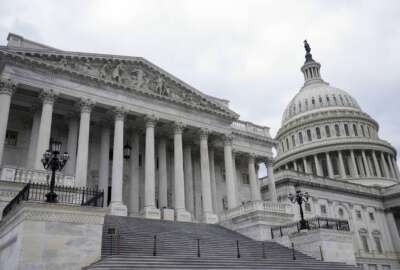
Hubbard Radio Washington DC, LLC. All rights reserved. This website is not intended for users located within the European Economic Area.
Hubbard Radio Washington DC, LLC. All rights reserved. This website is not intended for users located within the European Economic Area.
The House Select Committee on the Modernization of Congress went out of business with the conclusion of the 117th Congress. But the committee's long list of rec...
The House Select Committee on the Modernization of Congress went out of business with the conclusion of the 117th Congress. But the committee’s long list of recommendations will continue under a new subcommittee. For more, on the Federal Drive with Tom Temin hear the former select committee chair, Rep. Derek Kilmer (D-Wash.) discussed this in a Q & A with U.S. Chamber of Commerce Executive VP Tom Quaadman at a Chamber event in Washington, D.C. on Friday, Feb. 3.
Interview transcript:
Derek Kilmer
About every 20 or 30 years or so, Congress realizes things aren’t working the way they ought to, and they create a committee to do something about it. The most recent iteration was called the Select Committee on the Modernization of Congress, which makes it sound like we were the IT Helpdesk, but we were nicknamed the Fix Congress Committee. And our mission, simply put, was to make Congress work better for the American people. In that regard, we looked at a number of issues. How does Congress as an institution, recruit, retain and have more diverse staff? How does Congress have a more civil and collaborative culture? How do we deal with issues like schedule and calendar? And among the issues we looked at, that I know is germane to today’s summit is, how does Congress use technology?Tom Temin
As his high tech wireless microphone faltered, Kilmer said Congress has been described as an 18th century institution, using 20th century technology.Derek Kilmer
To solve 21st century problems.Tom Temin
Kilmer said a number of the committee’s 202 recommendations focused on Congress’s technology base. Asked for an example, Kilmer said.Derek Kilmer
One of the challenges Congress faces is, that members of Congress, on average, sit on 5.4 committees and subcommittees. If you look at pre-pandemic back in 2019, Congress was in session for 57 full days and 58 travel days. By and large, all of your committee meetings are packed into those full days. And unfortunately, currently, there is no system to de-conflict, that schedule. Which is why if you’re watching C-SPAN, first, you have too much time on your hands. But if you’re watching C-SPAN, and you notice that there’s not people in their committee. It’s not that they’re blowing off work, it’s that they’re probably in three or four other committees at the same time. So one of our recommendations was, if you want Congress to function, you need to have the committee’s function. Which means members need to be able to be in committee for something other than showing up right before it’s their time to speak, giving five minute speech and then piecing out. So one of the recommendations we made was, to do what basically every college and university and high school when the country does, use technology to de-conflict the schedule. Does not sound like rocket science. One of the other recommendations that we made was, to use technology better. So that as an institution, Congress is better capable of making policy based on evidence, not just based on ideology. We recommend establishing a new commission on evidence based policymaking within the legislative branch. Having the institution onboard things, like data analytics, so that the institution can make better decisions for the American people. I think it’s really very important.Tom Temin
Kilmer also cited the topic of constituents help. Local voters come to a member of Congress with say, a problem with Veterans Affairs or Social Security, the member reaches out to an agency and perhaps gets a matter resolved.Derek Kilmer
So what you have is, in essence, 435 independent contractors getting their own individualized data from their constituents. But there is no use of technology to aggregate that data to say, hey, wait a minute, turns out this issue with the VA Incomers Office, was also a problem with the VA that 50 other offices got calls about. Hey, that is a systemic problem. Let’s go solve that as a policy problem, not just as a casework problem. So one of our recommendations was to use technology to aggregate casework data, so that we can actually solve some of the problems facing our constituents. Whether it be with the VA, with immigration, with the IRS or any other federal agency. We made recommendations also, about how Congress as an institution onboards technological innovation. We’ve proposed the establishment and they’ve just stood it up of a congressional digital service, to actually look at how Congress onboards new innovation. I was a member of Congress, I was a new member who came in January of 2013. I was upon my swearing in, handed a pager. I am not quite sure what to do with it.The institution needs to be more modern. That’s not just about how we communicate with ourselves or communicated with, but it also gets it how we communicate with our constituents, how we solve problems for our constituents. And so a number of the recommendations that we made in the technological space, really focused there. Beyond that, outside of the technology realm, some of the most important recommendations. And I really give credit to the chamber, because it was outspoken in the importance of helping to build the capacity of the institution. It is hard for Congress to solve big problems for the American people, if it has self lobotomized. You’ve seen things like, the elimination of the Office of Technology Assessment back in the 90s. You’ve seen things like, the constant erosion of funding for committee staff. And as a consequence, the institution has, generally the turnover, the average staff member has a tenure of under three years. It is hard for the institution to develop its brains to solve big problems, in part, because once you get someone who’s smart enough to solve a problem, they get hired away. And so a lot of the recommendations we made and I really appreciated the Chamber’s engagement on this, we’re really trying to build up the brain power of Congress as an institution so that it can solve problems.
Tom Quaadman
We’re in a new Congress. So this Congress is not reauthorize this select committee. You have 202 bipartisan recommendations that did come and select committee. How do you see that work moving forward? Or do you even see it moving forward?Derek Kilmer
Yeah, this is actually a good news story. At the end of the last Congress, our select committee, as it was expiring, made two recommendations. One, it said, Congress should look at how it modernizes and look at reform issues as a matter of course, not waiting every 20 or 30 years to do it. So what we recommended was, at the very least, there should be these types of reform committees every three or four Congress’. Beyond that, though, we also made a proposal to create a new subcommittee, under House administration to focus on implementation of these 202 recommendations. Now, here’s the good news. 45 of them have been fully implemented, there’s another 70 or so that are in the process of implementation. But it requires paying attention to that. Congress is a slow moving machine. And having at least some folks were assigned the task of putting eyes on the implementation, I think is really important. To the credit of the new majority, they took that recommendation and ran with it. So a new committee, a new subcommittee under house admin has been established, focus on congressional modernization. It’s going to be chaired by Stephanie Bice (R) from Oklahoma. I will serve as its ranking member. And I’m excited about that, because I think we will continue to put the pressure on to ensure forward motion of some of these reform ideas.Tom Quaadman
One of the reasons why we want to make sure we were having this summit, was to bring the private sector together with the public sector. Figure out what some of the solutions are, but also to make sure that we can make government IT modernization a priority. We’re going to now have discussions on, which sort of started yesterday between Speaker McCarthy (R-Calif.) and President Biden on, OK, how do we deal with the debt ceiling? But below that, how do we deal with spending? So is IT modernization for the government? Does that have his space in this conversation?Derek Kilmer
I sure hope so. Because I think there are areas where Congress can make investments in the use of technology. Where you both improve the efficiency of the government, you improve transparency within the government, you address real vulnerabilities around cybersecurity, which I think are certainly an issue for congressional offices and for federal agencies. Some of these will require investments, I think over the long haul. And the [Federal Aviation Administration (FAA)] example is a good one, because when you had that technological issue, it cost a lot of money. It had a huge impact to business to travelers. Some of these investments will save us enormous money down the road. And I think IT modernization needs to be part of the discussion around, how to make government more efficient and more effective for the American people.
Copyright © 2024 Federal News Network. All rights reserved. This website is not intended for users located within the European Economic Area.
Tom Temin is host of the Federal Drive and has been providing insight on federal technology and management issues for more than 30 years.
Follow @tteminWFED

